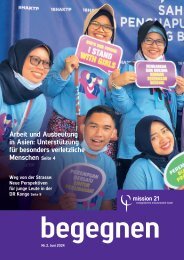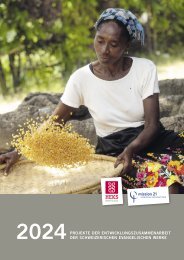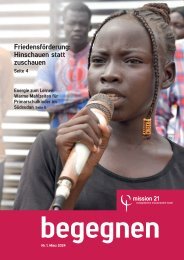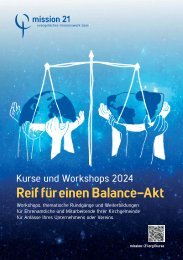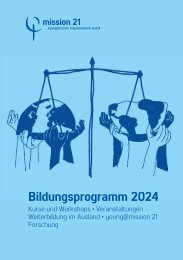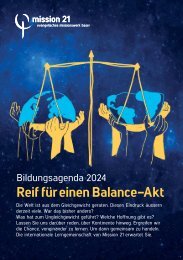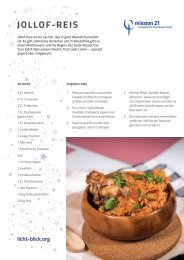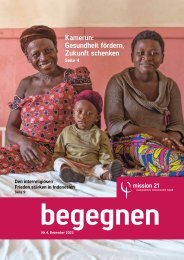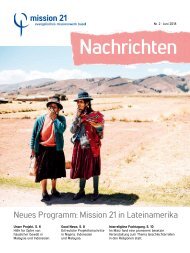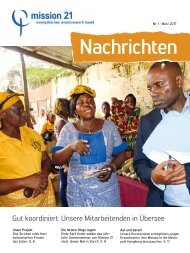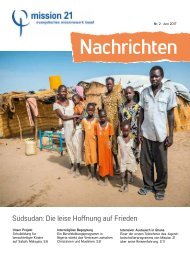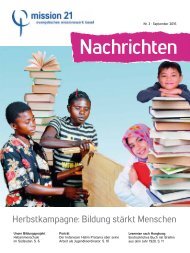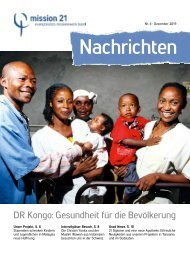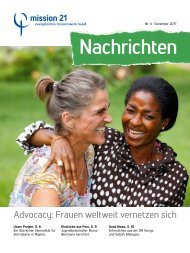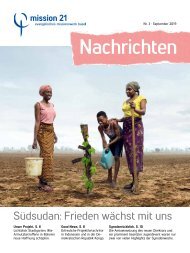Annual Report 2019
Annual Report 2019
Annual Report 2019
Create successful ePaper yourself
Turn your PDF publications into a flip-book with our unique Google optimized e-Paper software.
several “husbands” for her. She was introduced<br />
to them by human traffickers who charged money<br />
for their “matchmaking” services. After a<br />
while, each partnership would be dissolved and<br />
a new one would be arranged. Indah explains<br />
that the children born from these partnerships<br />
were all taken away from her except for Arfi, her<br />
first son. He clings to her arm as she tells her<br />
story, hiding his face under her headscarf.<br />
During our meeting with Indah, we only hear<br />
fragments of her story; many questions still<br />
remain to be answered. One thing is clear: she<br />
had hoped for a better life – but instead, she was<br />
trapped in total dependency. Without a passport,<br />
with no money and no support network,<br />
she was unable to defend herself.<br />
“Tens of thousands of Indonesian women<br />
have the same experiences as Indah every year.”<br />
These are the words of Karmila Jusup, a counsellor<br />
at the Durebang Center emergency accommodation<br />
facility in the Indonesian metropolis<br />
of Bandung. The Durebang Center is a haven for<br />
women like Indah. Karmila Jusup helped her<br />
when she returned to Indonesia.<br />
Working at the level of society<br />
As well as emergency accommodation for women,<br />
the Durebang Center offers legal advice,<br />
medical assistance and psychological support<br />
in cases of domestic violence or sexual exploitation.<br />
The Center is part of the Pasundan Christian<br />
Church (GKP), one of Mission 21’s partner<br />
churches. Together with other organisations,<br />
the GKP is stepping up its efforts to assert the<br />
rights of female migrant workers. One major<br />
aspect of this work is prevention: Indonesian<br />
women are given advice before they leave the<br />
country, and they are informed about the risks<br />
as well as their rights. Income promotion projects<br />
in various regions also offer prospects for<br />
women in their homeland (see pages 18–19),<br />
giving them an alternative to migration.<br />
For women like Indah, support from the<br />
counsellors at the Durebang Center can make<br />
the difference between life and death. The people<br />
who provide this help need many skills. This<br />
is why the Durebang Center in Bandung also<br />
provides practical training for staff from other<br />
regions. The result is that all the participating<br />
partner organisations have trained staff available<br />
to provide pastoral care, counselling and<br />
support for the victims of domestic violence and<br />
human trafficking.<br />
But those responsible for running the Center<br />
are not merely concerned with individual cases.<br />
“We also want to achieve something at the level<br />
of society as a whole,” Karmila Jusup explains.<br />
The Center’s employees visit schools to raise<br />
awareness about gender equity and sexual exploitation.<br />
The Durebang Center is integrated<br />
within a regional interfaith network of institutions<br />
that also operate at the political level. They<br />
lobby for more gender equity and the protection<br />
of human rights, and they seek to bring about<br />
peaceful coexistence among Indonesia’s religious<br />
groups.<br />
The objectives of this work coincide with the<br />
UN’s Sustainable Development Goals (SDGs).<br />
The UN has defined gender equity and peaceful,<br />
inclusive societies as two of its seventeen development<br />
goals. One result of these efforts: the<br />
Durebang Center was involved in drawing up the<br />
“shadow report” for the United Nations on the<br />
situation of women in Indonesia.<br />
Interfaith collaboration<br />
The interfaith component is always an important<br />
aspect of the work undertaken by the<br />
GKP and its partners. Indonesia has the largest<br />
Muslim population of any country in the world.<br />
But Indonesian society also includes several<br />
other recognised religions as minorities. “Interfaith<br />
collaboration is a core issue for us,” Karmila<br />
Jusup points out. This work is part of peace<br />
promotion, just like efforts to end violence<br />
against women.<br />
Interfaith collaboration is integrated into<br />
the everyday routine at the Durebang Center:<br />
the majority of its clients are Muslims. And the<br />
GKP also works closely with the Sapa Institute,<br />
a Muslim non-government organisation that is<br />
in direct contact with women in remote villages.<br />
Indah is now living back in her village, where<br />
she continues to receive support from the<br />
Durebang Center team. She would like to get a<br />
job in Indonesia, and she wants to offer her son<br />
a better future. Her first wish has not yet been<br />
fulfilled, but one step has already been taken towards<br />
making the second one come true: Arfi is<br />
attending a school for the first time in his life.<br />
Miriam Glass<br />
Communication Team<br />
Project contributions for<br />
peace promotion<br />
Total: CHF 678 734<br />
In Africa:<br />
CHF 229 048<br />
In Asia:<br />
CHF 449 686<br />
0 10 % 20 % 30 % 40 % 50 % 60 % 70 %<br />
13




